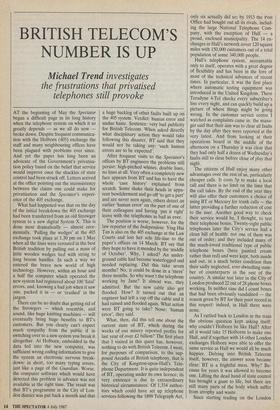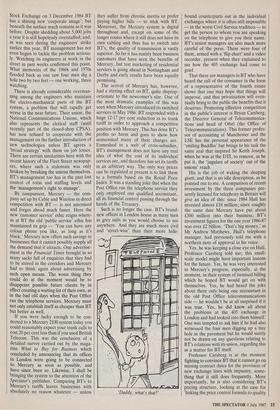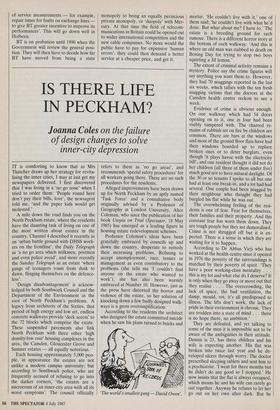BRITISH TELECOM'S NUMBER IS UP
Michael Trend investigates
the frustrations that privatised telephones still provoke
AT the beginning of May the Spectator began a difficult page in its long history when the telephone system on which it so greatly depends — as we all do now broke down. Despite frequent communica- tion with the Holborn (405) exchange the staff and many neighbouring offices have been plagued with problems ever since. And yet the paper has long been an advocate of the Government's privatisa- tion policy based on the belief that service would improve once the shackles of state control had been struck off. Letters arrived at the office pointing out the inconsistency between the claims one could make for privatisation and the Spectator's experi- ence of the 405 exchange.
What had happened was that on the day of the initial breakdown the 405 exchange had been transferred from an old Strowger system to a new digital System X. This is done most dramatically — almost cere- monially. 'Pulling the wedges' at the 405 exchange took place at 1.30 pm on 1 May when all the lines were rerouted in the best British tradition by pulling out a mass of little wooden wedges tied with string to long broom handles. In such a way we entered the brave new world of high technology. However, within an hour and a half the computer which operated the new system had registered about 100 'fatal' errors, and, knowing a bad job when it saw one, packed it in — or 'crashed' in the jargon.
There can be no doubt that getting rid of the Strowgers — which resemble, and sound, like huge knitting machines — will eventually bring huge benefits to BT's customers. But you clearly can't expect much sympathy from the public if in switching over to a new system you break it altogether. At Holborn, embedded in the data fed into the new computer, was sufficient wrong coding information to give the system an electronic nervous break- down: in short, too many typing errors, just like a page of the Guardian. Worse, the computer software which would have detected this problem in advance was not available at the right time. The result was that BT's programme in the City of Lon- don district was put back a month and that a huge backlog of other faults built up on the 405 system. Verdict: human error and undue haste. Sentence: very bad publicity for British Telecom. When asked directly what disciplinary action they would take following this disaster, BT said that they would not be taking any: 'such human errors are to be expected'.
After frequent visits to the Spectator's offices by BT engineers the problems still persist: high-pitched whines, double lines, no lines at all. Very often a completely new face appears from BT and has to have the whole 'case history' explained from scratch. Some shake their heads in appa- rent bewilderment and go off 'to get a part' and are never seen again, others detect an earlier 'human error' on the part of one of their colleagues and having 'put it right' leave with the telephones as bad as ever.
The position is worse, however, for the law reporter of the Independent. Ying Hui Tan is also on the 405 exchange at the Law Courts and lost her sole life-line to the paper's offices on 14 March. BT say that they hope to have it mended by the 'middle of October'. Why, I asked? An under- ground cable had become waterlogged and needed replacing. Did this take seven months? No, it could be done in a 'mere' three months. So why wasn't the telephone working by June? It almost was, they, admitted. But the new cable also got flooded. How? It turned out that an engineer had left a cap off the cable and it had rained and flooded again. What action were BT going to take? None: 'human error', they said.
What, then, did this tell one about the current state of BT, which during the weeks of our misery reported profits for last year of over £2 billion? The first place that I visited in this quest has, however, nothing to do with British Telecom. I went, for purposes of comparison, to the sup- posed Arcadia of British telephony, that is the City of Kingston-upon-Hull's Tele- phone Department. It is quite independent of BT, operating under its own licence; its very existence is due to extraordinary historical circumstances. Of 1,334 author- ities which could have set up telephone services following the 1899 Telegraph Act, only six actually did so; by 1913 the Post Office had bought out all its rivals, includ- ing the large National Telephone Com- pany, with the exception of Hull — a proud, enclosed municipality. The 14 ex- changes in Hull's network cover 120 square miles with 150,000 customers out of a total population of some 340,000 people.
Hull's telephone system, accountable only to itself, operates with a great degree of flexibility and has been in the fore of most of the technical advances of recent times. In particular, it was the first place where automatic testing equipment was introduced in the United Kingdom. There Teradyne 4-Tel checks every subscriber's line every night, and can quickly build up a picture of where things might be going wrong. In the customer service centre I watched as complaints came in: the mana- ger said that their aim was to clear all faults by the day after they were reported at the very latest. And from looking at their operations board in the middle of the afternoon on a Thursday it was clear that they had only half a dozen of Wednesday's faults still to clear before close of play that night.
The citizens of Hull enjoy many other advantages over the rest of us, particularly cheaper calls. It costs 5p to make a local call and there is no limit on the time that the call takes. By the end of the year they will also offer their customers a choice of using BT or Mercury for trunk calls — the latter providing a further reduction of cost to the user. Another good way to check their service would be, I thought, to test their telephone boxes. Twenty-eight public telephones later the City's service had a clean bill of health: not one of them was out of order; and they included many of the much-loved traditional type of public telephone boxes (here painted cream rather than red) and were kept, both inside and out, in a much better condition than their sadly neglected, ever-dwindling num- ber of counterparts in the rest of the country. A similar test later in the City of London produced 22 out of 28 phone boxes working. In neither case did I count boxes that had been obviously vandalised — the reason given by BT for their poor record in this respect: indeed, in Hull there were none.
As I rattled back to London in the train the obvious question kept asking itself: why couldn't Holborn be like Hull? After all it would take 15 Holborns to make one Hull, and if together with 14 other London exchanges Holborn were able to offer the same service as Hull we would all be much happier. Delving into British Telecom itself, however, the answer soon became clear: BT is a frightful mess. Why? Be- cause for years it was allowed to become one. Lifting the dead hand of state control has brought a giant to life, but there are still many parts of the body which suffer from atrophy and waste.
Since starting trading on the London Stock Exchange on 3 December 1984 BT has a shining new 'corporate image'; but beneath the surface much remains as it was before. Despite shedding about 5,000 jobs a year it is still hopelessly overstaffed; and, as was seen during the engineers' strike earlier this year, BT management has not even begun to tackle the problem serious- ly. Watching its engineers at work in the street in past weeks confirmed this point. What memories of the 1960s and 1970s flooded back as one saw four men dig a hole two by two feet — one working, three watching.
There is already considerable overman- ning among the engineers who maintain the electro-mechanical parts of the BT system, a problem that will rapidly get worse in the near future. Their union, the National Communications Unions, which also represents the clerical staff (until recently part of the closed-shop CPSA), has now refused to cooperate with the management on the further introduction of new technologies unless BT agrees a `broad strategy' with them on job losses. There are certain similarities here with the recent history of the Fleet Street newspap- ers, where such a stalemate was only ,broken by breaking the unions themselves. BT's management too has in the past lost control of rotas and staffing levels and the 'management's right to manage'.
By comparison, Mercury — the com- pany set up by Cable and Wireless in direct competition with BT — is not unionised and forges ahead much faster. Here the new 'customer service' ethic reigns where- as at BT the old 'public service' ethic has maintained its grip — 'You can have any colour phone you like, as long as it's black.' Mercury now offers such savings to businesses that it cannot possibly supply all the demand that it attracts. One advertise- ment in the Financial Times brought in so many sacks full of enquiries that they had to be stored in the corridors and Mercury had to think again about advertising by such open means. The worst thing they could do at the moment would be to disappoint possible future clients by in effect creating a waiting list of their own, as in the bad old days when the Post Office ran the telephone services. Mercury must not only establish itself as cheaper than BT but better as well.
If you were lucky enough to be con- nected to a Mercury 2100 system today you could reasonably expect your trunk calls to cost 20 per cent less than if you used British Telecom. This was the conclusion of a detailed survey carried out by the maga- zine What to Buy for Business which concluded by announcing that its offices In London were going to be connected to Mercury as soon as possible, and have since been so. Likewise, I shall be bringing the system to the attention of the Spectator's publisher. Comparing BT's to Mercury's tariffs leaves businesses with absolutely no reason whatever — unless they suffer from chronic inertia or prefer paying higher bills — to stick with BT. Moreover, the Mercury system is digital throughout and, except on some of the longer routes where it still does not have its own cabling and thus has to switch into BT's, the quality of transmission is vastly superior. So far it has mainly been business customers that have seen the benefits of Mercury, but test marketing of residential services is going ahead in Nottingham and Derby and early results have been equally promising.
The arrival of Mercury has, however, had a stirring effect on BT, quite disprop- ortionate to the newcomer's size. One of the most dramatic examples of this was seen when Mercury introduced its switched services in May 1986. BT responded with a huge 12-17 per cent reduction in its trunk tariff in order to approach a competitive position with Mercury. This has done BT's profits no harm and goes to show how nonsensical many of their charges are. Enmeshed in a web of cross-subsidies, BT's management does not have any real idea of what the cost of its individual services are, and therefore has set its tariffs in an arbitrary way. The only way prices can be regulated at present is to link them to a formula based on the Retail Price Index. It was a standing joke that when the Post Office ran the telephone service they only employed one qualified accountant, all its financial control passing through the hands of the Treasury.
Such is no longer the case. BT's brand- new offices in London house as many men in grey suits as you would choose to see anywhere. And they are much more civil and 'street-wise' than their more hide- `Daddy, what's that?' bound counterparts out in the individual exchanges where it is often still impossible — in the worst Civil Service tradition — to get the person to whom you are speaking on the telephone to give you their name. BT's senior managers are also much more careful of the press. There were four of them, armed with a 'flip chart' and a video recorder, present when they explained to me how the 405 exchange had come to grief.
That there are managers in BT who have heard the call of the consumer in the form of a representative of the fourth estate shows that one may hope that things will improve, and that privatisation will even- tually bring to the public the benefits that it deserves. Promoting effective competition in the public's interest is Bryan Carsberg, the Director General of Telecommunica- tions and head of Oftel (the Office of Telecommunications). This former profes- sor of accounting at Manchester and the LSE has the personal appearance of the `smiling Buddha' but brings to his task the same zeal that inspired Sir Keith Joseph, when he was at the DTI, to remove, as he put it, the 'jugulars of society' out of the unions' reach.
His is the job of waking the sleeping giant; and that is no idle description, as he pointed out to me. A comparison of recent investment by the three companies pre- sently licensed for telephony in Britain will give an idea of this: since 1984 Hull has invested almost £18 million; since roughly the same date Mercury have put about £300 million into their business; BT's investment figures for the one year 1986-87 was over £2 billion. 'That's big money,' as Mr Andrew Matthews, Hull's telephone manager, had previously told me with a northern note of approval in his voice.
Yes, he was keeping a close eye on Hull, Professor Carsberg told me; this small- scale model might have important lessons for the future. Yes, he was very interested in Mercury's progress, especially, at the moment, in their system of itemised billing which he hoped BT would get on with themselves. Yes, he had heard the joke about there only being one accountant in the old Post Office telecommunications side — he wouldn't be at all surprised if it was true. Yes, he did know all about the problems at the 405 exchange in London and had looked into them himself. One was tempted to ask him if he had also witnessed the four men digging up a tiny hole in the pavement but he would surely not be drawn on any questions relating to BT's relations with its union, regarding this as a matter for BT itself.
Professor Carsberg is at the moment fighting to convince BT that it cannot go on missing contract dates for the provision of new exchange lines with impunity, some- thing that it still does frequently. More importantly, he is also considering BT's pricing structure, looking at the case for `linking the price control formula to quality of service measurements — for example, repair times for faults on exchange lines to give BT greater incentive to improve its performances'. This will go down well in Holborn.
BT is on probation until 1990 when the Government will review the general posi- tion. They will then have to decide how far BT have moved from being a state monopoly to being an equally pernicious private monopoly, or `duopoly' with Mer- cury. At that time the field of telecom- munications in Britain could be opened out to wider international competition and the new cable companies. No more would the public have to pay for expensive 'human errors': they could then demand a better service at a cheaper price, and get it.




















































 Previous page
Previous page